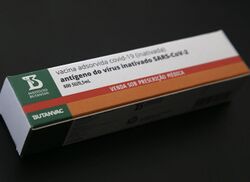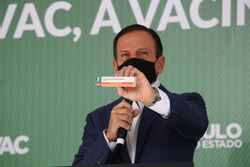Medicine:NDV-HXP-S Covid-19 vaccine
 Packaging for the Brazilian version of NDV-HXP-S, ButanVac | |
| Vaccine description | |
|---|---|
| Target disease | SARS-CoV-2 |
| Type | viral |
| Clinical data | |
| Trade names | ButanVac (Brazil) |
| Routes of administration | Intranasal |
NDV-HXP-S (known as ButanVac[1] in Brazil) is a COVID-19 vaccine candidate developed by a team led by Jason McLellan at the University of Texas at Austin,[2] together with groups from the Icahn School of Medicine at Mount Sinai and the National Institute of Allergy and Infectious Diseases Vaccine Research Center, based on an improved spike protein central to its resilience and efficacy.[3]
Development
Its development was coordinated by the PATH Center for Vaccine Innovation and Access, and UT Austin and ISMMS have arranged royalty-free licensing agreements with labs and corporations in 80 countries. McLellan has noted that "the share of vaccines ['low- and middle-income countries' have] received so far is terrible".[3]
Unlike already-in-use vaccines such as Moderna's mRNA-1273, the Janssen vaccine, and Pfizer–BioNTech's tozinameran which all require both specialized manufacturing facilities and also rare or expensive ingredients, NDV-HXP-S can be produced using chicken eggs in a fashion similar to flu vaccine production, making it especially important to and for middle- and low-income countries.[3] Those existing vaccines are based on the 2P spike, while NDV-HXP-S is further refined via the same process, resulting in a new spike called HexaPro;[4] the 2P spike contained two prolines compared with HexaPro's six. It is also more resistant to heat and chemicals than the original 2P spike; the vaccine can be stored at 2–8 ºC.[5] NDV-HXP-S uses the Newcastle disease virus as its viral vector.[6]
The name NDV-HXP-S comes from the terms Newcastle disease virus, HexaPro, and spike protein.[5]
Clinical research

As of April 2021[update] NDV-HXP-S is undergoing initial clinical trials in humans in at least four countries. In Brazil, on March 26, 2021 the Butantan Institute announced it would seek to begin clinical trials. Mexico-based Avimex plans to create an intranasal spray version of the vaccine. In Thailand the Government Pharmaceutical Organization is conducting a trial in coordination with Mahidol University.[7][8] Reflecting the freedom offered by the ease of the manufacturing process, Thai health minister Anutin Charnvirakul referred to the vaccine as "produced by Thai people for Thai people".[3]
pt:ButanVac
References
- ↑ "Brazil posts record 3,650 new COVID-19 deaths, unveils two homegrown vaccines". Reuters. March 26, 2021. https://www.reuters.com/article/us-health-coronavirus-brazil-vaccine/brazil-posts-record-3650-new-covid-19-deaths-unveils-two-homegrown-vaccines-idUSKBN2BI1KF. "Earlier, Sao Paulo's Butantan biomedical institute said it will seek approval ... Butantan aims to produce 40 million doses of the Butanvac vaccine ... The vaccine was developed using a modified virus, which causes the Newcastle disease in birds ..."
- ↑ "What will it take to make an effective vaccine for COVID-19?". Chemical & Engineering News 98 (28): 35–42. 20 July 2020. doi:10.1021/cen-09828-cover. https://cen.acs.org/pharmaceuticals/vaccines/take-make-effective-vaccine-COVID/98/i28.
- ↑ 3.0 3.1 3.2 3.3 "Researchers Are Hatching a Low-Cost Coronavirus Vaccine". The New York Times. April 5, 2021. https://www.nytimes.com/2021/04/05/health/hexapro-mclellan-vaccine.html.
- ↑ "Structure-based design of prefusion-stabilized SARS-CoV-2 spikes". Science 369 (6510): 1501–1505. September 2020. doi:10.1126/science.abd0826. PMID 32703906. Bibcode: 2020Sci...369.1501H.
- ↑ 5.0 5.1 "Human Trials Begin for a Low-Cost COVID-19 Vaccine to Extend Global Access". April 5, 2021. https://news.utexas.edu/2021/04/05/human-trials-begin-for-a-low-cost-covid-19-vaccine-to-extend-global-access/.
- ↑ "Newcastle disease virus (NDV) expressing the spike protein of SARS-CoV-2 as vaccine candidate". EBioMedicine 62: 103132. 2020. doi:10.1016/j.ebiom.2020.103132. PMID 33232870.
- ↑ Clinical trial number NCT04764422 for "Assess the Safety and Immunogenicity of NDV-HXP-S Vaccine in Thailand" at ClinicalTrials.gov
- ↑ "Thai-made vaccine ready 'by next year'". Bangkok Post (Bangkok Post Public Company Limited). 11 February 2021. https://www.bangkokpost.com/thailand/general/2066063/thai-made-vaccine-ready-by-next-year.
